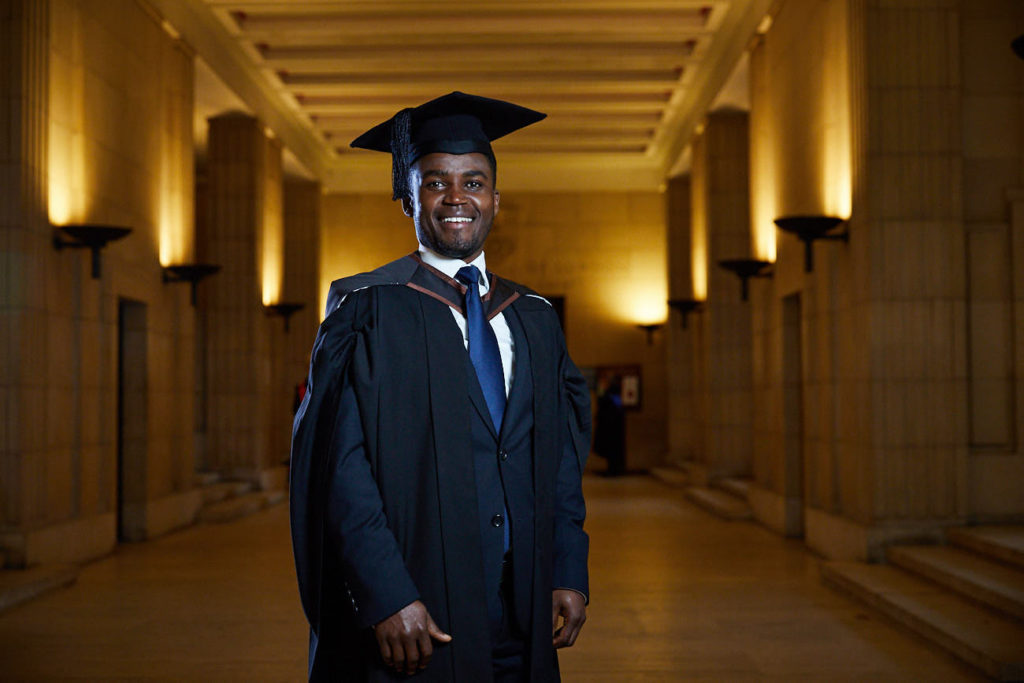After an accident left Esther Adegoke with a disability she sought to complete her studies in Politics at Birkbeck. Last week, she graduated with a First.
Esther doesn’t recall exactly what sparked her interests in studying politics. Just that her sisters who had studied politics at AS level would come home and discuss topics from their classes, topics that piqued her interest more than any of the GSCE subjects she was studying at the time.
After completing her A levels she opted for a degree in Politics at the University of Leicester. In the beginning of her third year she was involved in an accident that left her using a wheelchair and in need of a full-time care team, meaning she could no longer study in Leicester. Determined to continue her degree, Esther looked for options in her home city of London where she came across Birkbeck, “what gave Birkbeck the winning edge for me was the evening classes, it was more practical having lectures at 6pm because it fit my routine as opposed to morning lectures and seminars.”
At Birkbeck, Esther found new topics that sparked her interests in Politics further and in different ways. “My favourite course, funnily enough wasn’t a module taken under the politics department but actually the psychosocial department called, ‘racism and antisemitism’. I found it interesting because it did something unique in that it challenged us to investigate the commonalities and differences between anti-black racism and antisemitism. Of course, I had seen instances of the two racisms being studied separately, but never together.”
Fortunately, Esther had the support of her family and friends who were pivotal in helping her complete her work. “My mum accompanied me to every lecture and seminar I attended and my sisters often read my essays.” The College’s Disability team were also instrumental in allowing her to complete her course. She recalled: “My disability officer Mark Pimm and scribe Yvonne Plotwright were a massive support to me. Mark went above and beyond to ensure that my points were taken seriously and Yvonne was extremely thorough in her note-taking, ensuring I didn’t miss any vital information from my lectures and seminars.”
The accident left her unable to speak for long periods of time before her voice became exhausted so she used EyeGaze to help her craft her essays. EyeGaze is software that enables the individual’s eye to control the mouse and keyboard of a computer. She explained: “I took to it rather quickly, I used to use it recreationally and even then I was told the hours I would spend on it were unheard of. Without Eye Gaze I wouldn’t have been able to complete my degree. “
Now Esther has graduated with a First Class degree, recognition for all of her determination and resilience. She says of her achievement, “It felt amazing, I was over the moon with my result and without sounding arrogant it was even more rewarding because I knew I deserved it. I worked so hard for it so it was special to know my hard work had actually paid off.”
Unsure of what she will do next, Esther still feels positive about her future. “My experience at Birkbeck with the assistance of Eye Gaze has really given me the confidence to say that my disability does not have to halt my career options in a way I previously thought they would. I have often said that I have no plans to return to study after my undergraduate degree but never say never; at least I know it’s a case of if I want to go back as opposed to I can’t.”
Dr Ben Worthy, Senior Lecturer in the Department of Politics said: “Here at the Department of Politics, we are all so proud of what Esther has achieved and honoured to have been able to help her in her studies. She’s not only been a model student but an inspiration to us all. We also want to say a big thank you to everyone around her, especially the disabilities office and her family and friends who supported her along the way.”
Further information


